Reverse Osmosis & Water Treatment in Bolivia
CHUNKE projects of Reverse Osmosis Water Treatment in Bolivia including different types of water treatment systems.
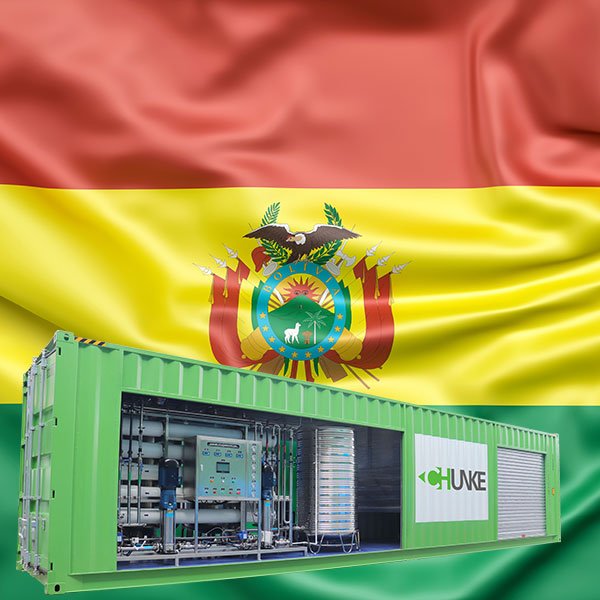
Bolivia,officially the Plurinational State of Bolivia, is a landlocked country located in western-central South America. It is bordered by Brazil to the north and east, Paraguay to the southeast, Argentina to the south, Chile to the southwest, and Peru to the west. The seat of government and administrative capital is La Paz, which contains the executive, legislative, and electoral branches of government, while the constitutional capital is Sucre, the seat of the judiciary. The largest city and principal industrial center is Santa Cruz de la Sierra, located on the Llanos Orientales (tropical lowlands), a mostly flat region in the east of the country.
The sovereign state of Bolivia is a constitutionally unitary state, divided into nine departments. Its geography varies from the peaks of the Andes in the West, to the Eastern Lowlands, situated within the Amazon basin. One-third of the country is within the Andean mountain range. With 1,098,581 km2 (424,164 sq mi) of area, Bolivia is the fifth largest country in South America, after Brazil, Argentina, Peru, and Colombia (and alongside Paraguay, one of the only two landlocked countries in the Americas), the 27th largest in the world, the largest landlocked country in the Southern Hemisphere, and the world’s seventh largest landlocked country, after Kazakhstan, Mongolia, Chad, Niger, Mali, and Ethiopia.
Total Renewable Water Resources per Capita in Bolivia
In 2020, renewable water resources per capita for Bolivia was 49,173.2 cubic meters per year. Between 1971 and 2020, renewable water resources per capita of Bolivia was declining at a moderating rate to shrink from 125,279.9 cubic meters per year in 1971 to 49,173.2 cubic meters per year in 2020.
- Renewable surface water: 547.9 billion cubic meters per year
- Renewable groundwater: 130 billion cubic meters per year
- Renewable water resources: 574 billion cubic meters per year
The Importance of Water Treatment
Water is a vital resource for human survival, and ensuring its cleanliness is crucial for maintaining public health. Unfortunately, many countries, including Bolivia, face water scarcity and contamination issues. It is making it challenging to provide safe drinking water to their populations. So, to address these challenges, innovative water treatment technologies have been developed, offering effective solutions to purify water from various sources.
CHUNKE Projects of Water Treatment in Bolivia
Meanwhile, CHUNKE designs and produces water treatment systems that meet the World Health Organization requirements. Our pumps, dosing pumps, reverse osmosis membranes, electronic components, and drives are all world-renowned suppliers. So, our water treatment in Bolivia is suitable for drinking.
CHUNKE has over 15 years of experience as a global provider of B2B water treatment solutions for a variety of applications and industries. Hence, we offer a large selection of all types of reverse osmosis, ultrafiltration, electrodeionization. And also, water treatment systems to meet your industrial needs accordingly. So, CHUNKE’s extensive global experience in engineering and manufacturing allows us to pre-engineer and customize water treatment and reverse osmosis systems to meet a wide range of customer requirements and specifications.
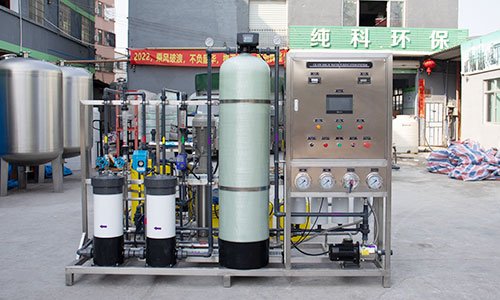
500L-Seawater Desalination Equipment
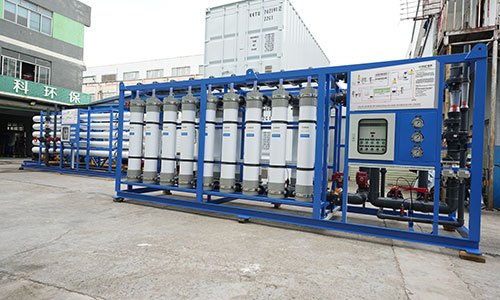
90T Ultrafiltration + 36T Seawater Desalination Equipment
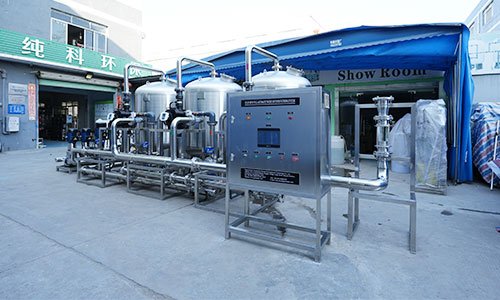
80T Softening System
Equipment
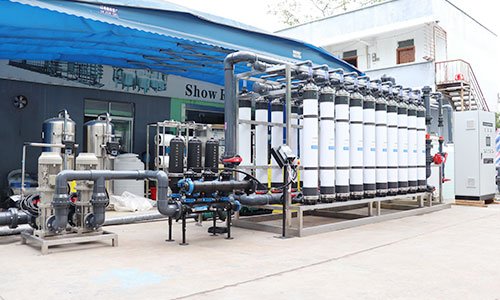
1000LPH Reverse Osmosis System for Water Filling Sitation
Reverse Osmosis: A Key Water Treatment Technology
Reverse Osmosis (RO) is a widely used water treatment technology in Bolivia due to its effectiveness in removing impurities from water. RO systems utilize a semi-porous membrane and a high-pressure pump to separate salts, minerals, and other contaminants from the water. So, this process involves applying pressure to the saline side of the membrane, allowing only pure water molecules to pass through while rejecting impurities. Hence, RO systems are commonly used for brackish water treatment, where the salt concentration is between freshwater and seawater levels.
Seawater Desalination: Overcoming Water Scarcity
Bolivia grapples with a major challenge: freshwater scarcity. Seawater desalination, however, offers a promising solution. These systems use RO technology to purify seawater by removing salt and other impurities. As a result, it becomes suitable for drinking and other uses. By tapping into the vast seawater resources, Bolivia can maintain a steady supply of clean water, effectively addressing its water scarcity issue.
Reverse Osmosis Systems for Water Treatment
Reverse osmosis (RO) systems play a significant role in water treatment in Boliviaa. These systems are designing to remove dissolved minerals, bacteria, particles, and organic impurities from water. And it is producing high-purity water suitable for various applications. So, the RO process involves the use of a semi-permeable membrane that separates impurities from the water, leaving behind clean and purified water.
Ultrafiltration: Enhancing Water Quality
Ultrafiltration (UF) is another water treatment technology gaining popularity in Bolivia. UF systems utilize membranes with smaller pore sizes compared to RO systems, allowing for the removal of bacteria, viruses, and other suspended solids. So, UF is particularly effective in treating surface water sources such as rivers and lakes, where microbial contamination is a concern. By implementing UF systems, Bolivia can significantly improve the quality of its water resources, providing safe drinking water to its population.
Electrodeionization: Purifying Water for Industrial Use
In addition to providing clean drinking water, water treatment technologies are also essential for industrial applications. So, one such technology is Electrodeionization (EDI), which combines ion exchange and electrochemical processes to remove ions and impurities from water. So, EDI systems are commonly used in industries such as mining, smelting, and food and beverage production, where high-quality water is required for various processes. By utilizing EDI systems, Bolivia can meet the water quality requirements of its industrial sector, promoting sustainable economic growth.
Industrial Reverse Osmosis Machines: Meeting Industrial Demands
Industrial processes often require large quantities of purified water, making Industrial Reverse Osmosis Machines crucial for meeting these demands. These machines are specifically designed to handle high volumes of water and efficiently remove contaminants, ensuring the water’s suitability for industrial use, accordingly. By investing in robust and reliable industrial RO systems, Bolivia can support its growing industrial sector while minimizing the environmental impact caused by water usage.
Water Filtration: Ensuring Safe Water for All
Water filtration plays a vital role in ensuring safe water for both domestic and industrial use. So, filtration systems are designed to remove particulate matter, sediment, and other impurities from water, improving its clarity and taste. Meanwhile, in Bolivia, water filtration technologies such as activated carbon filters, media filters, and membrane filters are widely used to enhance water quality. By implementing comprehensive water filtration systems, Bolivia can ensure that clean and safe water is accessible to all its citizens, accordingly.
Water Purification: A Holistic Approach
Water purification encompasses a range of treatments and processes to eliminate contaminants from water, making it safe for consumption. Hence, in Bolivia, a holistic approach to water purification is essential to address the diverse water quality challenges across the country. So, this approach involves integrating multiple treatment technologies such as RO, desalination, ultrafiltration, and disinfection methods to ensure comprehensive water purification. By adopting such an approach, Bolivia can effectively tackle its water quality issues. And it can provide its population with access to clean and safe water.
Chunke is Trusted Water Treatment Supplier from China
Chunke Water Treatment‘s expertise in producing high-quality reverse osmosis systems has contributed to improving water treatment capabilities in Bolivia. So, their reliable and efficient RO plants have been implemented in various projects across the country, ensuring access to clean and safe drinking water.
